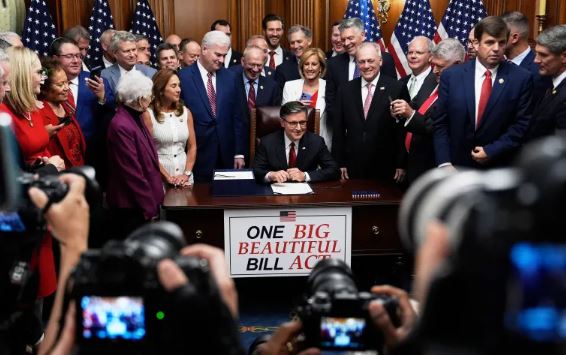The House on Thursday passed the signature piece of legislation of President Trump`s second term, approving a massive bill that includes trillions of dollars in tax and spending cuts while ramping up funding for defense and implementing the administration`s immigration agenda.
The lower chamber voted 218 to 214 to approve the measure, with two Republicans — Reps. Thomas Massie of Kentucky and Brian Fitzpatrick of Pennsylvania — joining all Democrats in opposing the bill. The Senate passed the legislation, dubbed the "big, beautiful bill," earlier this week, reports CBS News.
President Trump plans to sign the bill at a ceremony at the White House on Friday, coinciding with the July 4 holiday.
The vote came after a marathon overnight session that saw GOP leaders overcome internal opposition to advance the bill, paving the way for final passage. Most Republican members who balked at many of the changes the Senate made to the legislation eventually relented and voted to pass it.
Once it became clear that GOP leaders had the votes they needed, House Democratic Leader Hakeem Jeffries tried to delay the inevitable by speaking on the floor for 8 hours and 44 minutes, setting the record for the longest House speech in U.S. history. He called out Republicans for the bill`s deep cuts to Medicaid and food assistance programs, highlighting the Americans who he said would suffer because of the bill.
Johnson touted the legislation`s passage after the vote, outlining the long path to passage since the bill was initially dreamt up more than a year ago, while saying it all came down to "belief."
"We had a vision for what we wanted to do as a group. We believed in the election cycle last fall that we were going to be given this great blessing of unified government," Johnson said. "And we did not want to waste that opportunity."
The nonpartisan Congressional Budget Office estimates the bill would add $3.4 trillion to federal deficits over the next 10 years and leave millions without health insurance, due to the cuts to Medicaid and programs under the Affordable Care Act. It would also dramatically increase funding for immigration enforcement, a key priority for Republicans and the president.




-20260226080139.webp)



-20260223082704.webp)










-20260225072312.webp)










-20260219054530.webp)
-20260224075258.webp)





-20260221022827.webp)